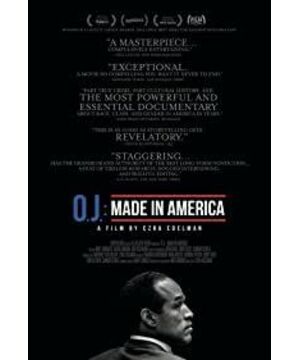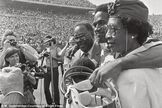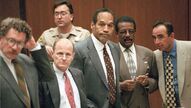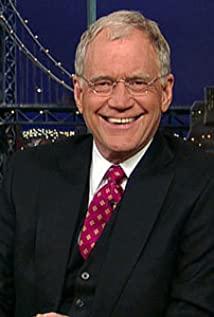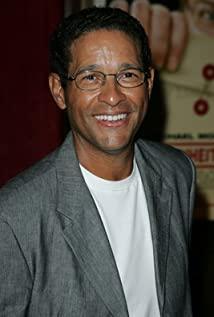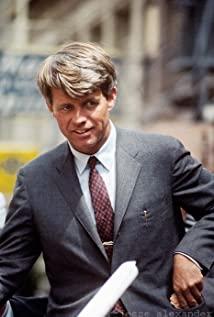With the narrative space already extremely limited, "Made in America" can actually dance on the tip of a needle and get an Oscar figurine. In addition to the narrative skills and the thickness of the content, it is more important that it gives the witnesses, bystanders and all the outsiders who have suffered a misfortune a collective opportunity to reflect on the event: Who should be responsible for this absurd tragedy made in the United States?
The fans of the authorities, even the witnesses and participants of the event, may not be able to jump out of the individual experience at the time and realize a macro and overall view. In "Made in America", the extension and expansion of the time-space ruler realizes the juxtaposition of synchronic and diachronic in the image grammar. Without a preset position, a large number of details are complementary and tit-for-tat, making the skinny. The separated cases return to the full, multi-sense, and treacherous social reality, which also allows the latecomers who have traveled through the time barrier to start from the depth of history and go back to the butterfly that first instigated the wings of the year.
While all the horizons of expectations focused on how to achieve the second interpretation of the trial of the century, "Made in America" risked a huge distraction and used 180 minutes to describe Simpson's growth. history. This kind of opening is a battle between the creator and the viewer. The slow, trivial details of life have greatly suppressed the audience's curiosity and interest like new archeological discoveries, showing strong content confidence and rhythm control, which forces everyone It settles down to treat all the people in the whirlpool of the Simpson case and that era with caution and compassion rather than curiosity for pleasure.
The clock of tragedy began to oscillate in the 1960s, which was Simpson's high school and college years. In 1968, on one side of this special historical cross-section was Simpson's Heisman Award-winning singing and dancing, black and white family; on the other side, the assassinations of Martin Luther King and Robert Kennedy, hippies Sports, and the black boxing incident at the Mexico City Olympics. Those exquisite reversal shots and cross-editing, coupled with the rap music that coincides with the situation, and the details and golden sentences that continue to emerge in the interview, clearly explain the absurdity of an era and the tension of ethnic conflict. 1968, thus fixed as the starting point of the glory of King Simpson, is also destined to be the beginning of tragedy and destiny.
In fact, the title made in the United States has alluded to Simpson's fate. On the one hand, it stems from a tension between control and escape between individuals and communities. Unlike today’s NBA games that Chinese audiences are most familiar with, Jordan Kobe James and other black celebrities dominate the world. In the American professional sports of the 1960s, "black athletes first need to consider the interests of the community, and then sports itself." When Muhammad Ali, Bill Russell, Jimmy Brown and other ancient gods, surrounded by the black community, blew the black storm of professional sports, they lingered in the environment of the white elite and kept emphasizing that “I don’t want to be discolored The "definition" Simpson is more like a defector with black skin and white heart. From a rational point of view, he wants to get rid of the humiliation mark beginning with the "N" and become a pure sports star. The experience of refusing to speak for the civil rights movement is easily reminiscent of ethnic pressures such as "not turning to Chinese". And moral kidnapping. However, individual choice must consider the rigid principle of "political correctness" in the context of a specific era and group situation. Just as Wang Jingwei, who chose "curve to save the country", became a traitor, in the era of turbulent affirmative movement, Simpson, who "does not want to be defined by skin color," became a crude egoist in the eyes of the black community, begging for the white "black". evil".
But the complexity of the problem lies in the fact that the continuous growth of the black civil rights movement has given them their own will to power, and they have gradually shifted from their political demands for equality and anti-discrimination to their own existence and maximization of interests. These organizations have a strong desire to control the individual will. They have portrayed themselves as the incarnation of "political correctness," and spread such concepts throughout the world. Simpson’s growth era still had the impulse and possibility to get rid of the skin color label and to be himself; while in the age of his fall, the skin color he wanted to get rid of eventually became a killer move with impunity, and it was completely impossible to escape the community’s control. Net out.
On the other hand, this notorious trial of the century is also the product of ethnic tears and collective evil. Simpson is undoubtedly the protagonist of this absurd play, but the event eventually evolved into a mass carnival of ethnic opposition and collective irrationality, but he was not the initiator. The pity of Simpson is that although he did not take responsibility for individual crimes, he has become a trash can for all collective evils. "Made in America" used a large amount of first-hand information to remove the fig leaf on the scars of history: all the jurors, prosecutors, defense lawyers, trial judges, civil rights leaders, media public opinion, and all audiences regardless of skin color. All are the actors and promoters of this funny tragedy.
In many cases, quantity is justice. In the face of collective conspiracy, the boundaries and definitions of good and evil often become suspicious. Even if we recognize that this is a ridiculous mistake, we always tend to attribute the collective evils that everyone has participated in to the times and to others, but few individuals are responsible for the evils of local individuals at that time. "Made in America" meticulously portrays the absurdity of the Simpson case and everyone's excuses. The jurors believed that it was a tactical error by the prosecutor. The prosecutor believed that it was the encounter with the pig teammates. The civil rights leaders believed that it was caused by the long-term oppression of whites and stimulated the long-simmering social sentiment. The white police believed that it was the stupidity and selfishness of the blacks, and the media thought it was the audience. Booing, the audience thinks it is the inducement of public opinion. Everyone thinks that someone should be responsible for the incident, but no one thinks that they should be held responsible.
Le Pen said in "The Crowd", "Once an individual becomes a member of a group, he will no longer take responsibility for what he does. Everyone will expose his unconstrained side. The group pursues and believes in nothing. Truth and reason, but blind obedience, cruelty, paranoia and fanaticism, only know simple and extreme feelings." When the elderly black juror was asked whether the Simpson case was a revenge for Rodney King, she waved her hands and answered Yes without hesitation. All the cruelty and fanaticism, simplicity and extremes, are displayed drippingly on her waving hands.
"Made in America" brings a different emotional impact from the past. It leads the ridicule, hatred and curse of Simpson to the silence of collective reflection. Those aerial shots that are constantly used are like the final judgment of the reincarnation of the heavens from the perspective of God, but also a metaphor for the compassion and helplessness that cannot completely eliminate the rift between the ethnic groups. Reconciliation is only when there is truth. After peeling the cocoon and deepening layer by layer, I hope it can become a key for human beings to understand each other.
View more about O.J.: Made in America reviews


